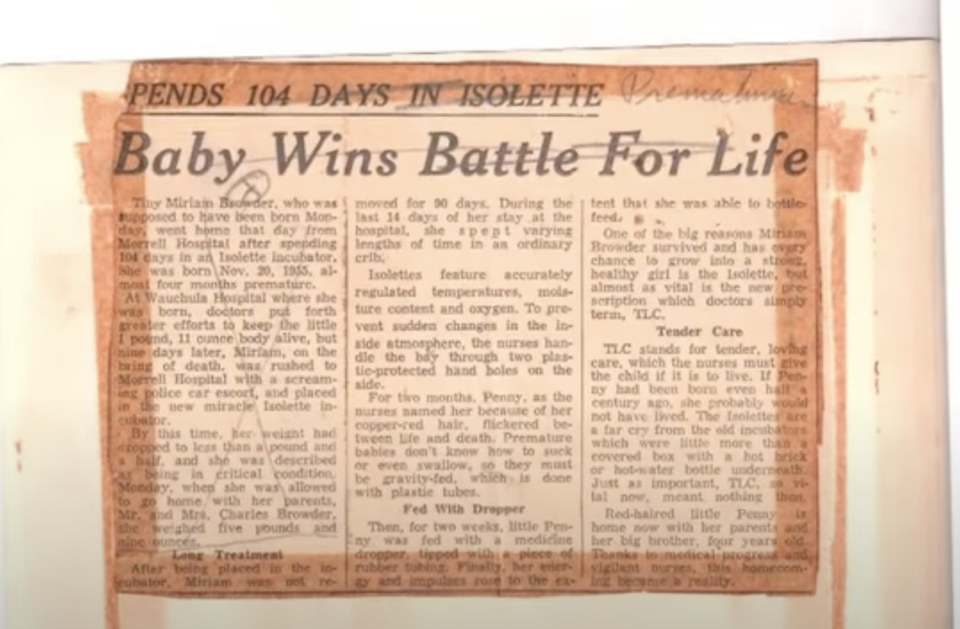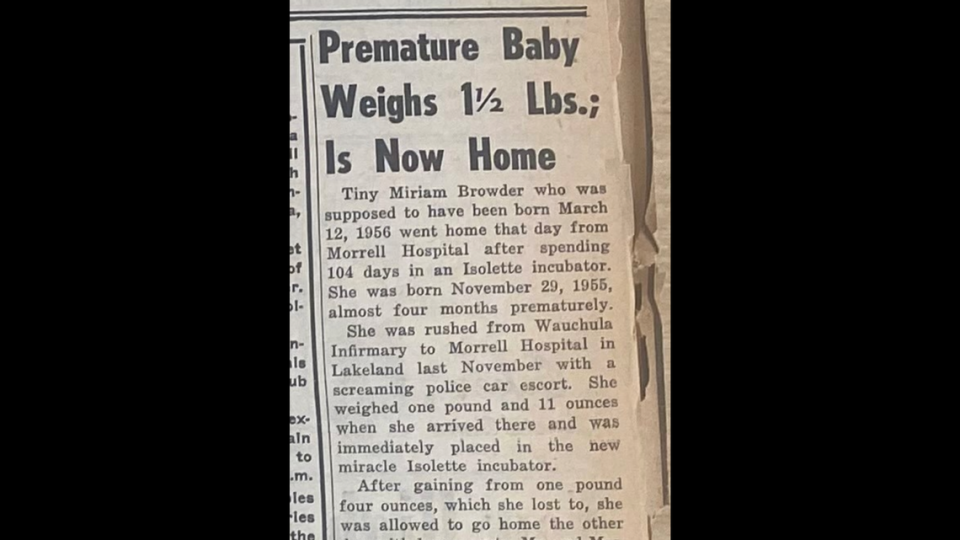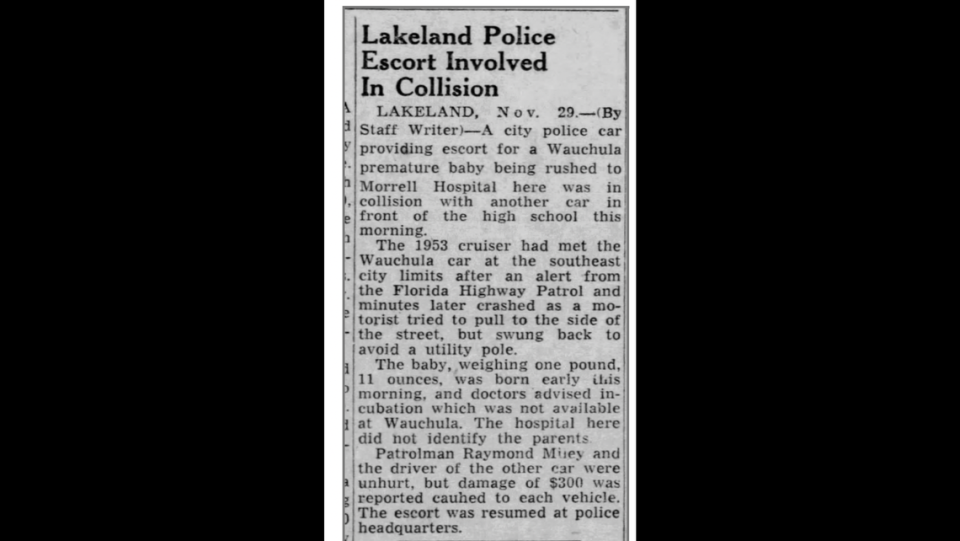DeSantis said at debate a woman survived ‘multiple abortion attempts.’ Here’s the real story
- Oops!Something went wrong.Please try again later.
At Wednesday’s Republican candidates debate, during a discussion of late-term abortion, Gov. Ron DeSantis told a horrific but puzzling story.
“I know a lady in Florida named Penny,” the GOP presidential candidate said. “She survived multiple abortion attempts. She was left discarded in a pan. Fortunately, her grandmother saved her and brought her to another hospital.”
Critics of the governor flocked to social media to suggest the “Penny” story was made up or wildly embellished. Supporters countered that liberals were triggered by an ugly truth.
Penny is real and her last name is Hopper. But DeSantis failed to note key details from her remarkable story: The person who tried to end Penny’s life in the womb was not a doctor or even an illegal abortion provider — it was her father. And his effort to abort his daughter with a coat hanger took place almost two decades before the Supreme Court’s seismic Roe v. Wade decision, which established a woman’s right to an abortion.
While DeSantis’ version of Penny’s story honors life and a woman who survived a traumatic beginning, it also reflects the perils of a world where abortion is all but outlawed and women can be forced into dangerous, desperate alternatives.
This article is based on previous recorded statements made by Hopper, newspaper clippings, public records and an interview with a family member who after speaking to a journalist at length asked not to be identified. She confirmed that Hopper’s version of events has been told in family circles for years.
“Penny” Hopper declined to be interviewed and did not respond to written questions submitted by the Miami Herald.
The DeSantis campaign did not respond to a request for comment.
A small farming town
Miriam “Penny” Hopper’s story begins in 1955, in a hospital in Wauchula, a small farming town in Central Florida. News reports at the time described her as a miracle baby, born weighing 1 pound, 11 ounces. She was so tiny that the nurses initially had to feed her with a dropper.
Her now-deceased father, Charles Wesley Browder Sr., was a U.S. Army sergeant during World War II who served on the front lines in Europe when he was just 20. His family said he was a “scout” who performed advance reconnaissance missions before being wounded, captured and tortured by the Germans. Military records show he was discharged with honors in 1945 and was awarded four Bronze Stars in addition to a Purple Heart, a Good-Conduct Medal and the World War II Victory Medal.
A native of South Carolina and son of a Baptist minister, Browder moved to Central Florida after the war. Public records show he married Glenda Marie Pierce, the second-eldest daughter in a family of ranchers and citrus farmers who moved to Florida from North Carolina and settled in Wauchula, about 75 miles southeast of Tampa. Wauchula was then known as “the Cucumber Capital of the World,” and each year a high school girl would be crowned Miss Cucumber Queen.

In 1953, birth records show, Hopper’s parents had a son, Charles Browder Jr., who was born at Walker Memorial Hospital in nearby Avon Park. At the time of the 1950 census, Glenda worked as a receptionist in a doctor’s office, and Charles was a salesman.
Hopper’s mother soon became pregnant with her second child, also a boy. In a video posted on YouTube several years ago by a group called “Florida Right to Life,” Hopper said that she learned later that her father had used the coat hanger to abort her mother’s second child. It is one of at least two videos on the Internet relating her story, although the videos differ on some details.

When her mother became pregnant a third time with her, Penny Browder said her father returned to the same method in an attempt to end the pregnancy, later explaining to his daughter that he was earning only $125 a week, which he felt wasn’t enough to support a larger family.
Browder’s mother developed complications during the coat-hanger procedure. The couple rushed to a nearby medical facility in the middle of the night, with her mother very ill and bleeding. In the video interviews, Hopper said her parents were met at the clinic by a doctor in his pajamas. He examined her mother — and concluded that the fetus had no heartbeat. He advised the couple to abort the baby, telling them the child would likely be stillborn.
“If it lives, it will be a burden on you your whole life,” the doctor allegedly said. He used saline and injected her mother with a drug, then left, instructing the nurse to “discard the baby dead or alive,” Hopper said in a video interview, a segment that was to be incorporated into a TV commercial by the anti-abortion group “Faces of Choice.” It can be found on YouTube.
When the baby arrived shortly after 3 a.m., the nurse wrapped her in a towel and placed her in a pan, Penny Hopper said one video. In the other, Hopper said her mother told her the baby was placed in a basket.
The following day, Glenda’s mother and aunt came to check on her at the clinic, where she was recuperating. They found the baby outside on a back porch, unwrapped her, and discovered she was alive, Hopper said.
“My grandmother was so upset she called the local police,” she said.
A news clipping incorporated into a video segment said the baby was transported from the medical facility in Wauchula to what was then Morrell Regional Hospital in Lakeland. The news clipping, which isn’t labeled, seems to partially contradict Hopper’s story, as it states that the doctors at the Wauchula facility “put forth greater efforts to keep the 1 pound, 11 ounce baby alive.” The story said the child was on the “brink of death” when she was transported to Lakeland, with a police escort that crashed on the way to the hospital.

The Tampa Tribune from Nov. 29, 1955, reported on the crash, saying the baby had been born premature that morning. The infant was placed in an incubator, where she remained for four months. Hopper, however, said that while she was in the hospital her father tried to disconnect her from the incubator because he was upset at how much the care was costing. The hospital summoned the police to restrain him, Hopper said in one of the interviews.
“He basically couldn’t stand the thought I was alive,” Hopper said.
In March 1956, she was finally strong enough to go home with her parents. By that time, her hair had filled in and was a coppery red. The nurses were calling her “Penny” — the nickname that has stuck with her throughout her life.
Pro-choice groups say that Hopper’s story presents an even stronger case not to outlaw legal and safe abortions.
“Banning abortion doesn’t stop people from needing or seeking abortions,” said Marc Hearron, senior counsel for the Center for Reproductive Rights. “It just leads to abortions outside the formal healthcare system. … This story bears no resemblance to today’s reality.”
Dr. Washington Hill, an OB-GYN, specialist in maternal fetal medicine who supports legal abortion, said that because the doctor didn’t detect a heartbeat, it seems likely that he believed he was inducing labor to expel a stillborn infant.
“The doctor, for one reason or another, thought the baby was stillborn. Technically it was induced labor — not an induced abortion.”
‘She doesn’t want to be used as a political pawn’
It could not be determined whether Hopper had been contacted by the DeSantis campaign, whether the campaign vetted her story or if she knew it would be told to a national television audience.
“She doesn’t want to be used as a political pawn,” said the family member, explaining that Hopper prefers to work quietly behind the scenes to help those she sees as victims of botched abortions.
In one of her video interviews, Hopper said that before his death her father told her how much he regretted what he had tried to do.
“Before he passed away, he looked at me and said ‘Honey I don’t know what I’d done without you,’ ” Hopper recalls in the interview.
“No matter what circumstances my parents were facing surrounding my mother’s pregnancy, I ended up having great parents, I ended up having a great life.”
Miami Herald investigative reporter Sarah Blaskey and the Wauchula Herald-Advocate contributed.

